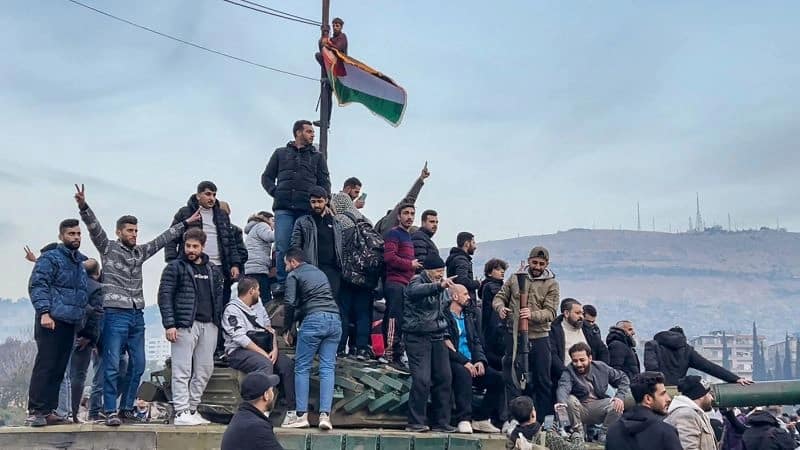The situation in Syria continues to evolve rapidly as multiple key events have unfolded, highlighting the ongoing instability and international involvement in the region. Key updates include reports that Syrian President Bashar al-Assad has fled to Moscow, US military jets conducting strikes against Islamic State (IS) targets in Syria, and an investigation into prison cells described as “human slaughterhouses” linked to Assad’s regime. These developments underscore the complex and multi-faceted nature of the conflict, involving both local and international actors.
1. Bashar al-Assad Flees to Moscow Amid Intensifying Pressure
Syrian President Bashar al-Assad, facing mounting pressure from multiple fronts, has reportedly fled to Moscow, Russia, marking a dramatic shift in the Syrian conflict. Sources close to the Syrian government indicate that Assad’s departure was prompted by an escalation of both military and political challenges to his regime.
Reasons for the Move:
- Military Setbacks: Despite Russian support in the form of airstrikes and military advisers, Assad’s forces have suffered significant losses in recent months. The Syrian Democratic Forces (SDF), alongside other opposition groups, have made significant territorial advances, particularly in the east and northwest, undermining Assad’s control over key areas.
- Internal Dissent: Within Assad’s circle, there have been growing signs of dissent. Reports indicate that several high-ranking officials in the Syrian military and intelligence services have begun distancing themselves from the regime, and there have been protests within Damascus and other major cities calling for his ouster.
- International Isolation: The regime has also faced increasing international condemnation. The United States and European Union have imposed heavy sanctions, while regional allies such as Iran and Hezbollah have started to distance themselves, signaling a possible shift in the balance of power.
Assad’s flight to Moscow is seen by analysts as an attempt to secure asylum and military protection from Russia, which has been his key supporter in the ongoing civil war. Moscow has historically provided critical military and political support to the Assad regime, and Russia’s Vladimir Putin has now become the central figure in determining Syria’s future.
2. US Jets Strike Islamic State Targets in Eastern Syria
In a separate development, US military jets have conducted a series of airstrikes against Islamic State (IS) targets in eastern Syria, marking a renewed effort by the United States to combat ISIS remnants in the region. The strikes targeted IS hideouts, weapon caches, and command and control structures in areas previously controlled by ISIS.
Background on US Strikes:
- Operation Inherent Resolve: The airstrikes are part of the ongoing US-led coalition operation to eliminate the remaining pockets of ISIS activity in Syria. Although ISIS no longer controls large territories, the group has continued to operate as an insurgency, carrying out attacks in both Syria and Iraq.
- Syrian-Iraqi Border: The majority of recent US strikes have focused on areas near the Syrian-Iraqi border, where ISIS has used the desert terrain to regroup and launch ambushes against Syrian and Iraqi military forces.
- Ongoing Threat: The Pentagon has repeatedly warned that while ISIS has been severely weakened, its cells remain capable of staging significant attacks, particularly in rural and border areas. US military officials have indicated that these strikes are part of an ongoing effort to prevent a resurgence of ISIS in the region.
The strikes have prompted strong reactions from the Syrian government and its allies, who have criticized US military operations on Syrian soil as illegal and unilateral. However, the US maintains that its presence in Syria is necessary to counter terrorism and protect regional stability.
3. Investigation into ‘Human Slaughterhouse’ Prison Cells
In a chilling new development, reports have emerged about an ongoing investigation into prison cells within Syria’s detention system that have been described as “human slaughterhouses”. These cells, which were reportedly used by the Assad regime, are said to be the sites of systematic torture, executions, and inhumane conditions that have drawn widespread condemnation from international human rights organizations.
Details of the Investigation:
- Human Rights Watch and other advocacy groups have uncovered evidence of atrocities committed within Syria’s military prisons, particularly in the Saydnaya Prison and Adra Prison. These facilities were used by Assad’s regime to imprison dissidents, activists, and anyone deemed to be opposed to the government.
- Conditions of the Cells: Prisoners held in these cells have reported being subjected to electroshock torture, beatings, and forced confessions. In some cases, prisoners were executed after lengthy periods of physical abuse. Survivors have recounted how bodies were often disposed of in mass graves, and overcrowding and lack of sanitation were rampant.
- UN and International Pressure: The United Nations has called for an immediate investigation into the human rights violations at these prisons, and the International Criminal Court (ICC) is reportedly considering charges of war crimes and crimes against humanity against Syrian officials involved in the torture and killings. The Syrian government has denied the allegations, claiming that the accusations are fabricated and part of a Western smear campaign.
These prison revelations have sparked global outrage, with many calling for justice for the thousands of Syrians who have been victims of government violence over the past decade. The discoveries are also drawing attention to the wider issue of prison reform and accountability in conflict zones.
Broader Implications:
Impact on Assad’s Regime:
- Instability and Legitimacy: The allegations of torture and extrajudicial killings only deepen the crisis for Bashar al-Assad’s regime. His departure to Moscow suggests a significant weakening of his power base in Syria, and the ongoing investigations into the regime’s practices will likely further damage his legitimacy on the world stage.
- International Isolation: With Assad now in Moscow and facing an international legal reckoning, his regime’s ability to maintain control over Syria’s fractured landscape is uncertain. The investigation into the prison camps could open new avenues for international intervention, especially as more evidence of war crimes surfaces.
Impact on US and Coalition Strategy:
- Continued US Engagement: The US strikes against ISIS targets are likely to continue, as the US military maintains its presence in eastern Syria to keep ISIS from regaining territory. However, the evolving political situation in Damascus and the possibility of Assad’s defection to Russia could complicate US strategy in Syria, as the US may need to reassess its objectives in the context of a regime in exile.
- Shifting Alliances: Russia’s increasing influence in Syria, coupled with its political and military support for Assad, could lead to new dynamics in the region. Should Assad remain in Moscow or face prosecution, Russia might have to re-evaluate its involvement, especially if the international community pushes for accountability over Syria’s human rights abuses.
Regional Impact:
- Syrian Civil War’s Long-Term Fallout: The war in Syria, which has been ongoing for over 13 years, has reshaped the entire region. The potential collapse of Assad’s regime would have profound implications for countries like Iran, Turkey, and Israel, who have had shifting allegiances depending on which side of the conflict they support.
- Humanitarian Crisis: The ongoing war has already led to a humanitarian catastrophe, with millions displaced both inside and outside Syria. If Assad’s regime weakens further, the humanitarian crisis may worsen, particularly in Idlib and other areas still controlled by opposition groups.
Conclusion: Uncertainty Ahead
The latest developments in Syria — Assad’s flight to Moscow, US airstrikes on ISIS targets, and the investigation into prison cells described as human slaughterhouses — signal a period of uncertainty for the future of the region. Assad’s departure raises questions about the future of his regime, while the ongoing war crimes investigations cast a shadow over the legitimacy of the Syrian government.
The US’s continued efforts to eliminate ISIS remnants, combined with international calls for justice, suggest that the conflict in Syria is far from over. Whether Assad can maintain any power or whether the international community will push for his prosecution remains uncertain, but the fate of Syria and its people seems poised for further upheaval as the war enters a new chapter.





